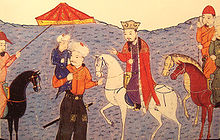User:HistoryofIran/Abaqa Khan
| This is a Wikipedia user page. This is not an encyclopedia article or the talk page for an encyclopedia article. If you find this page on any site other than Wikipedia, you are viewing a mirror site. Be aware that the page may be outdated and that the user in whose space this page is located may have no personal affiliation with any site other than Wikipedia. The original page is located at https://en.wikipedia.org/wiki/User:HistoryofIran/Abaqa_Khan. |
| Abaqa Khan | |
|---|---|
 Abaqa on a horse. His son Arghun stands beside him under a royal umbrella, with his own son, Mahmud Ghazan, in his arms. Rashid-al-Din Hamadani, early 14th century. | |
| Ilkhan | |
| Reign | 8 February 1265 – 1282 |
| Predecessor | Hulagu Khan |
| Successor | Ahmed Tekuder |
| Born | February 1234 Mongolia, Mongol Empire |
| Died | 4 April 1282 (aged 48) Hamadan, Ilkhanate |
| Consort | Buluqhan Khatun |
| Issue | Arghun Gaykhatu Oljath El Qutlugh Khatun |
| Dynasty | Borjigin |
| Father | Hulagu Khan |
| Mother | Yesuncin Khatun |
| Religion | Buddhism |
Abaqa Khan (also transliterated as Abaġa; Middle Mongolian: ᠠᠪᠠᠬᠠ
ᠬᠠᠨ, Persian: اباقا خان), was the second Mongol ruler (ilkhan) of the Ilkhanate. The son of Hulagu Khan and Lady Yesünčin. He was the grandson of Tolui and reigned from 1265 to 1282 and was succeeded by his brother Ahmed Tekuder. Much of Abaqa's reign was consumed with civil wars in the Mongol Empire, such as those between the Ilkhanate and the northern khanate of the Golden Horde. Abaqa also engaged in unsuccessful attempts at military invasion of Syria, including the Second Battle of Homs.
Background
[edit]Born in the February of 1234 in Mongolia, Abaqa was the eldest son of the first ilkhan Hulagu Khan (r. 1256–1265) and his consort Yesünčin Khatun. He took part in his fathers wars in the west, but was sent to the east at the onset of the war with Berke (r. 1257–1266) of the Golden Horde in 1261/2, in order to join forces with the Chagatai ruler Alghu (r. 1260–1265). At the time of Hulagu's death in February 1265, Abaqa served as the governor of the provinces of Khorasan and Mazandaran. He subsequently left for Azerbaijan, where he was elected as the new ilkhan by the aristocracy.[1][2]
Reign
[edit]Abaqa's first action as ilkhan was to reaffirm to his officers that they would keep the same ranks they had enjoyed under his father; Shiremün Noyan and his tamma would continue to stay in Georgia and watch over its frontier; Arghun Aqa kept the title of muqat’-i mamalik and remained in Khorasan; Suqunjaq Aqa was made governor of Baghdad and Fars, while Ata-Malik Juvayni was made his na’ib (assistant, deputy); Suqunjaq's brother, Tudan Ba'atur, and Elgäi Noyan's son, Tüqü Aqa, were also to retain their rank as the commander of the forces that protected the Sultanate of Rum[3]
From his father, Abaqa had inherited ongoing conflicts with his neighbours.
References
[edit]- ^ Jackson 1982, pp. 61–63.
- ^ Komaroff 2012, p. 96.
- ^ Hope 2016, p. 117.
Sources
[edit]- Hope, Michael (2016). Power, Politics, and Tradition in the Mongol Empire and the Īlkhānate of Iran. Oxford University Press. ISBN 9780198768593.
- Jackson, Peter (1982). "Abaqa". Encyclopædia Iranica, online edition, Vol. I, Fasc. 1. New York. pp. 61–63.
{{cite encyclopedia}}: CS1 maint: location missing publisher (link) - Komaroff, Linda (2012). Beyond the Legacy of Genghis Khan. Brill. pp. 1–678. ISBN 9789004243408.
